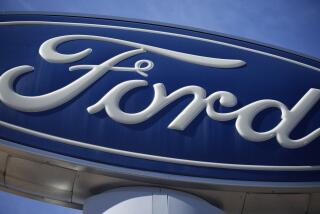Chrysler ends hybrid adventure before it can begin
Before it even started selling them, Chrysler is spiking its hybrids.
The troubled automaker said Tuesday that it would discontinue production of its Dodge Durango and Chrysler Aspen hybrid sport utility vehicles at year-end, when the company shuts down the Delaware plant that makes the two trucks. Chrysler is closing the plant because sales of the non-hybrid versions of the SUVs have been selling poorly. Through September, the company has sold 35,020 of the vehicles, a 40% drop from the 57,979 it sold a year ago.
The move will leave Chrysler without an alternative powertrain model for at least a year and probably longer. No other models are in line to get hybridized, though last month Chrysler unveiled two plug-in hybrids and a pure electric car, saying it would produce one of the models -- either a Jeep Wrangler, a Chrysler Town & Country or a two-seat sports car -- by late 2010.
The irony of the plant closure is that the long-awaited hybrids, Chrysler’s first foray into alternative powertrains, haven’t even hit dealership lots. After months of promotions and promises, they simply are nowhere to be found.
The company has said it has 3,000 orders for the hybrid models nationwide. Yet Chrysler’s sales report for September makes no mention of hybrids, while sales figures published by Autodata Corp. show none have sold. Dealer inventory searches on the Dodge and Chrysler websites revealed none in major metropolitan areas known to be hybrid hotbeds, including Seattle, San Francisco and L.A.
Calls to local dealers were no more fruitful. A salesman at Glendale Dodge said he soon expected to take delivery of three Dodge Durango hybrids. He said there was no waiting list for the vehicles. A salesman at Alhambra Chrysler Jeep Dodge said he was “not even sure when to expect the first one.”
The closure of the Newark, Del., plant was announced late last week amid news that Chrysler was laying off up to 25% of its salaried workforce.
Chrysler charges a significant premium for the hybrid versions of the mid-size SUV models. The Durango, with a base price of $45,340, comes at a 59% premium over the non-hybrid Durango, while the Aspen hybrid, at $45,570, is 30% more expensive than the traditional drivetrain Aspen.
That’s a considerably higher hybrid premium than found elsewhere in the market, a cost that is partially explained by the fact that, lacking its own hybrid technology, Chrysler buys it from General Motors Corp.
Toyota’s Highlander hybrid, for example, costs $34,700, 25% above what a non-hybrid version costs. And although the Ford Escape hybrid carries a 45% premium above the non-hybrid version, at $29,305 it’s still $16,000 cheaper than the Durango.
According to Chrysler, the Durango hybrid is rated at 19 mpg in city driving and 20 mpg on the highway, compared with 13 mpg city/19 mpg highway for the non-hybrid version. The company’s site indicates that the Aspen is not yet EPA rated, but the company says it gets 20 mpg city/22 highway.
Overall, sales of hybrid SUVs are down 11.5% through September compared with last year and light truck and SUV sales are down 20.6%.
With none available anywhere, Chrysler has an enticing offer for would-be buyers: The company is offering $1,000 cash back on either one.
--
--
latimes.com/uptospeed
Log on for the latest auto news tips and trends.






